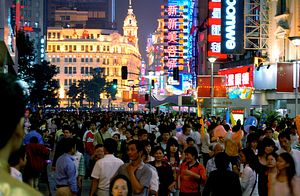About half of China’s 1.4 billion people will be on the move during “super golden week” — the 8-day holiday encompassing both the National Day holiday and the Mid-Autumn Festival. Thanks to the Lunar Year calendar, this year the Mid-Autumn Festival coincides with the National Day holiday, extending the usual vacation period from October 1 to October 8.
China National Tourism Administration said they expected about 710 million people to travel during the 8 days, while 49.8 percent of the total, nearly 350 million, would traveling by wheels. As to be expected, the first day and the final day of the holiday period will see the highest traffic peaks.
Since 2012, China has implemented a toll-free holiday policy which allows free passage of passenger cars with seven seats or fewer on toll roads, bridges and tunnels during four major public holidays — Spring Festival, Qing Ming Festival, Labor Day and National Day. The policy, although highly welcomed by the majority of private car owners, has also brought about more traffic jams nationwide during the holidays.
Information from China’s Ministry of Transport showed that traffic on highways in Beijing, Tianjin and Shanghai became congested around 6 a.m. on October 1 as city-dwellers hit the roads out of town.
As of October 2, multiple highways have been suffering from serious traffic jams and thousands of passengers have been trapped on the roads for hours on end. The South China Morning Post reported that the Guangzhou-Shenzhen Expressway, which connects Guangzhou, Dongguan and Shenzhen, has seen the “most serious” traffic congestion in years, and 90 percent of local coach services have had to halt their business. Numerous traffic polices in various cities posted on their Weibo accounts about the local traffic situation and suggested drivers take alternate routes. Meanwhile, drivers and passengers stuck in the traffic jams also took to Weibo to complain, posting pictures of congested roads accordingly.
Terrible traffic, however, won’t deter Chinese from traveling for the holidays.
China National Tourism Administration forecasted that domestic tourism revenue will reach 590 billion yuan (around $84 billion) this year, and cities like Sanya, Beijing, Kunming and Shanghai will be the most popular destinations.
Early in National Day — October 1, marking the 68th anniversary of the founding of the People’s Republic of China — more than 115,000 people gathered at Tiananmen Square in Beijing to watch the raising of the Chinese national flag.
China’s “super golden week” has also triggered a global tourism boom, particularly in China’s neighboring countries such as Thailand, Singapore and Japan. A Chinese travel service website published a report recently estimating, based on its own booking data, that more than 6 million Chinese people will travel overseas to 88 countries and regions all over the world. Ironically, the political factor also somewhat plays a role when Chinese people decide on their tourism destinations. For example, South Korea is likely to miss out on a big share of the Chinese tourism revenue, as China recently banned travel agencies from selling package tours to Korea due to the tensions over the THAAD missile defense system.

































